TMS Therapy for Dementia and Alzheimer's
BREAKTHROUGH TECHNOLOGY
Experience Lasting Relief from Depression With TMS Therapy
For decades, those facing Alzheimer's disease had few treatment options beyond medications that only temporarily slowed symptoms. Repetitive transcranial magnetic stimulation (rTMS) offers new hope by targeting the precuneus, a brain region that gets damaged early in Alzheimer's and controls memory loss and formation.
-
Covered by Insurance
-
FDA Approved
-
Covered by Insurance
-
FDA Approved
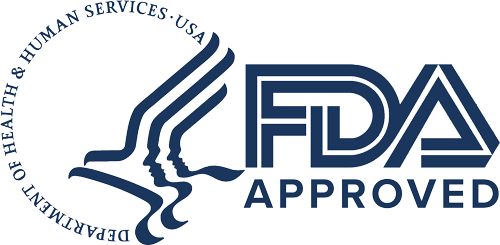
TAKE THE FIRST STEP TODAY
TMS Covered by Major Insurance Companies
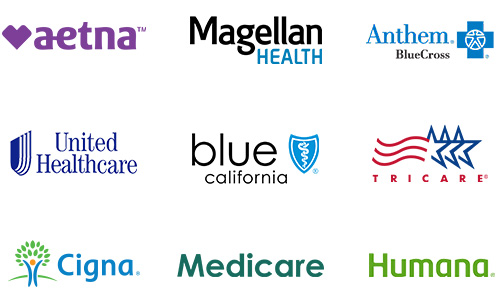
RESPONSE RATES
TMS Versus Medication
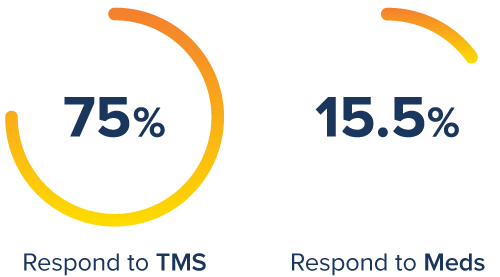
NEUROPLASTICITY
Brain Activity Increased with TMS
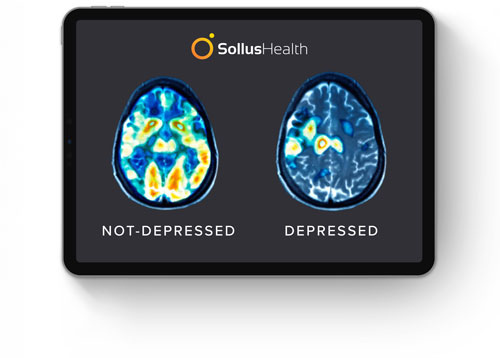
Proudly Serving San Diego Carlsbad Encinitas Oceanside San Marcos Vista
Break free from depression
Our team is here to guide you through a personalized journey to reclaim your mental health and regain control of your life.

Veterans facing memory concerns alongside trauma might find that TMS treatment for PTSD uses the same brain-stimulating technology, showing promise for cognitive preservation.
What is Precuneus rTMS?
Precuneus rTMS is a deep brain stimulation treatment that uses magnetic pulses to activate a specific brain region called the precuneus. Unlike medications that work throughout the entire body, this approach goes straight to the source of the problem - the exact brain areas where Alzheimer's disease causes the most damage. The precuneus sits in the back part of the brain and acts like a control center for memory, self-awareness, and how we think about ourselves and our experiences.
Repetitive magnetic stimulation works differently than pills or injections because it doesn't change your brain chemistry—instead, it uses magnetic fields to wake up brain cells that have become less active due to Alzheimer's disease (Koch et al., 2025).
How rTMS Works
- Magnetic Field Generation: A specialized coil creates gentle magnetic fields that pass through your skull to reach specific brain regions without any invasive procedures.
- Targeted Brain Stimulation: The magnetic pulses create small electrical currents in your brain tissue, helping inactive neurons start communicating with each other again.
- Personalized Mapping: Brain mapping technology and EKG monitoring help doctors find the exact spot on your head where treatment will be most effective for your individual brain.
- Pulse Delivery: Each 20-minute session delivers about 1,600 gentle magnetic pulses that feel like light tapping on your scalp.
- Customized Intensity: The strength of magnetic pulses is adjusted based on how your brain responds, ensuring you get the most benefit from each session (Koch et al., 2025).
New mothers struggling with postpartum depression don't have to rely on medications that might interfere with breastfeeding—treating postpartum depression with TMS offers a safe alternative.
Connection to the Default Mode Network (DMN)
In people with Alzheimer's, this network starts breaking down, which explains why patients lose their sense of self and have trouble forming new memories. Research shows that people who still have stronger connections in this network tend to respond better to rTMS treatment, and when rTMS targets the precuneus, it helps rebuild these damaged connections (Koch et al., 2025).
The Role of the Precuneus in Alzheimer's
The precuneus is one of the first brain areas to get hit hard by Alzheimer's disease, showing damage even before people notice memory problems. This brain region acts like a busy highway intersection where different types of thinking come together—from remembering where you put your keys to recognizing yourself in the mirror. When Alzheimer's strikes this area, it disrupts the brain's ability to:
- Memory Formation: The precuneus helps turn short-term memories into long-term ones, which is why people with Alzheimer's struggle to remember recent events.
- Self-Awareness: This region helps you understand who you are and maintain your sense of identity, abilities that decline as the disease progresses.
- Spatial Navigation: The precuneus processes information about where you are in space, explaining why people with Alzheimer's often get lost in familiar places.
- Brain Network Communication: It serves as a central hub connecting different brain networks, and when it stops working properly, the whole system breaks down.
- Early Disease Target: Because damage shows up here first, treating the precuneus early might help slow down the spread of Alzheimer's to other brain areas (Koch et al., 2025).
About the 52-Week Clinical Trial
Researchers recently completed a comprehensive year-long study following 48 patients with mild-to-moderate Alzheimer's disease to evaluate the long-term effectiveness of precuneus rTMS. This study stands out because most brain stimulation research only tracks patients for a few weeks or months, but this investigation monitored participants for a full 52 weeks to determine whether treatment benefits are sustained over time (Koch et al., 2025). Using a double-blind design where half received active treatment and half received sham stimulation, scientists could definitively prove that improvements came from the cognitive training treatment rather than placebo effects.
Study Design and Methods
The study used a gold-standard research design where 48 participants were randomly divided into two groups without knowing which treatment they received. One group received active rTMS while the other got a sham treatment that looked and felt the same but didn't actually stimulate the brain. Everyone started with two weeks of daily sessions, then switched to once-weekly treatments for the remaining 50 weeks (Koch et al., 2025). Doctors tested patients' memory, thinking skills, and daily activities at regular intervals to see how well the treatment was working.
Patient Selection Criteria
Only people with confirmed mild-to-moderate Alzheimer's disease could join the study, and they needed to meet specific requirements to participate. The research team used strict standards to make sure all participants had similar conditions for the most reliable results:
- Confirmed Alzheimer's Diagnosis: Participants had mild-to-moderate Alzheimer's disease verified by medical professionals using established diagnostic guidelines.
- Cognitive Test Scores: Everyone had to score between 0.5 and 1.0 on dementia rating scales and between 18-26 on memory tests to qualify.
- Brain Protein Evidence: Each person needed brain scans or spinal fluid tests showing the telltale protein buildup that happens in Alzheimer's disease (Koch et al., 2025).
- Stable Medication: All participants had to be on the same Alzheimer's medications for at least six months before starting the study.
Stimulation Protocol and Personalization
Doctors used brain mapping technology to find the exact right spot on each person's head for treatment. They also adjusted the magnetic pulse strength based on how each individual brain responded—most people needed about 55% of the machine's maximum power (Koch et al., 2025). This personalized approach helped make sure everyone got the most effective treatment possible.
Safety and Adverse Events
The treatment proved very safe, with only minor side effects that went away quickly on their own. The research team carefully tracked every health issue that came up during the year-long study:
- Mild Side Effects Only: The most common problems were temporary scalp discomfort, mild headaches, or brief neck pain that resolved without treatment.
- Similar to Fake Treatment: People getting real treatment had the same rate of side effects as those getting fake treatment, showing the problems weren't from the magnetic stimulation.
- No Serious Problems: No major health issues were linked to the rTMS treatment throughout the entire 52-week study period (Koch et al., 2025).
- Safe for Older Adults: The excellent safety profile makes this treatment a good option for elderly patients who might have trouble with medication side effects.
Clinical Results and Efficacy
After following patients for an entire year, researchers found that rTMS treatment made a real difference in slowing down Alzheimer's progression. The people who got the magnetic stimulation kept their thinking abilities and daily life skills much better than those who didn't get treatment. Most importantly, treated patients were able to stay independent longer, which means less burden on families and a better quality of life (Koch et al., 2025).
Improvements in Cognitive Function
People who received real rTMS treatment kept their thinking abilities much better than those who got the sham treatment. Two different memory tests showed clear differences between the groups:
- Alzheimer's Cognitive Assessment: Treated patients only declined by 5.9 points compared to 10.4 points in the control group over 52 weeks.
- Mini-Mental State Examination: rTMS patients lost just 1.1 points while untreated patients dropped 3.9 points during the year-long study (Koch et al., 2025).
Delay in Functional Decline
The most impressive results came from measuring how well people could handle everyday tasks like cooking, dressing, and managing money. People getting rTMS treatment maintained their independence throughout the entire year-long study, while those in the control group steadily lost the ability to take care of themselves (Koch et al., 2025). This 96% difference in functional decline means families can avoid or delay the difficult transition to full-time caregiving that usually comes with Alzheimer's progression.
Impact on Behavioral Symptoms
rTMS treatment also helped with the mood and behavior problems that often make Alzheimer's so challenging for families. Patients showed improvements in areas that typically worsen as the disease progresses:
- Reduced Apathy: Treated patients stayed more engaged and interested in activities rather than withdrawing from life.
- Better Appetite Control: The treatment helped normalize eating patterns, which often become disrupted in Alzheimer's disease.
- Improved Emotional Regulation: People had fewer mood swings and better control over their emotions (Koch et al., 2025).
- Stabilized Behavior: Overall behavioral symptoms remained more stable compared to untreated patients who showed typical worsening.
Statistical Significance and Outcomes
The numbers prove that rTMS treatment makes a real difference, not just minor improvements that might be due to chance. The primary measure of cognitive and functional ability showed treated patients declined 52% slower than the control group (Koch et al., 2025). Every other test the researchers used also favored the rTMS group, and these benefits lasted throughout the entire year-long study period.
Advanced TMS Therapy for Dementia and Alzheimer's at Sollus Health San Diego
At Sollus Health, we specialize in providing cutting-edge TMS treatment for individuals with Alzheimer's disease and related dementias throughout North County San Diego. Contact us today to learn more about how TMS therapy for Dementia and Alzheimer's may benefit you or your loved one.
YOUR QUESTIONS ANSWERED
Frequently Asked Questions

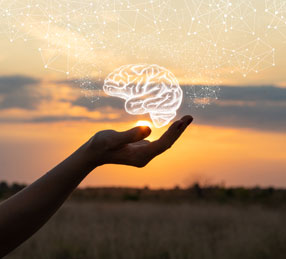

Can't find what you're looking for? Get in touch with our team and we will gladly help out.
TMS treatment can provide significant benefits for individuals with dementia by targeting specific brain regions affected by neurodegenerative processes. Clinical studies have demonstrated that personalized repetitive transcranial magnetic stimulation can slow cognitive decline, preserve daily living activities, and improve behavioral symptoms in patients with mild-to-moderate dementia.
The most effective therapy for dementia and Alzheimer's depends on the individual's specific condition, stage of disease, and neurological profile. Personalized precuneus rTMS has shown remarkable promise in clinical trials, particularly when combined with comprehensive assessment protocols that use TMS-ECG or TMS-EKG to optimize stimulation parameters for each patient's unique brain connectivity patterns.
Sources:
Koch, G., et al. (2025). Effects of 52 weeks of precuneus rTMS in Alzheimer's disease patients: a randomized trial. *Alzheimer's Research & Therapy*, 17(1), 1-11.
TAKE THE FIRST STEP TODAY
A Simple Process to Begin Your TMS Journey
Take the first step toward lasting relief from depression with TMS therapy, a non-invasive, medication-free treatment designed to restore your well-being.
Break free from depression
Our team is here to guide you through a personalized journey to reclaim your mental health and regain control of your life.
